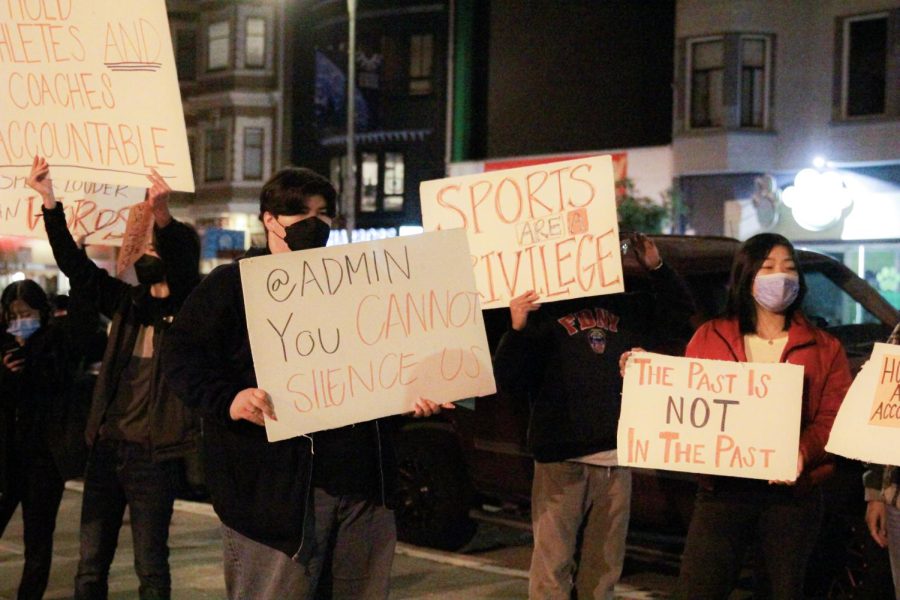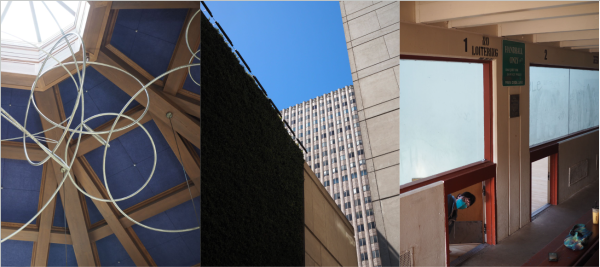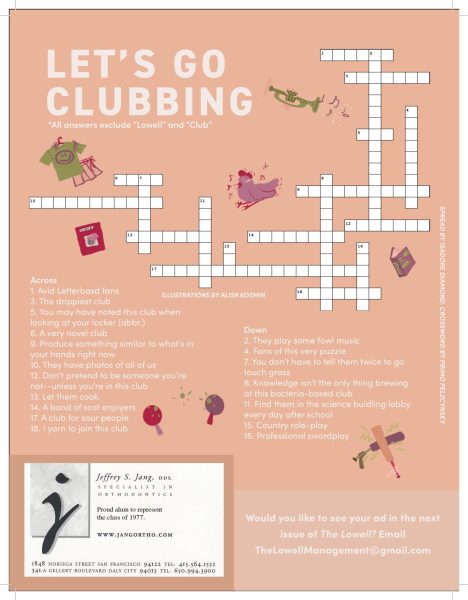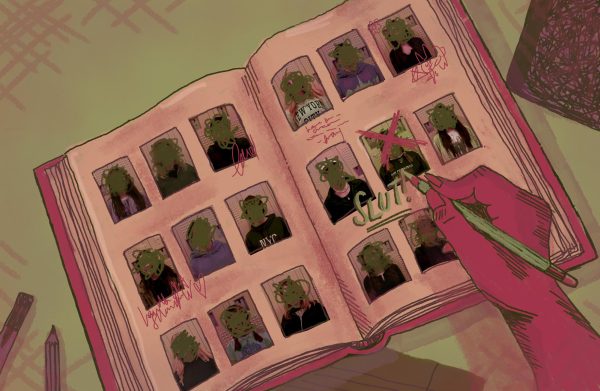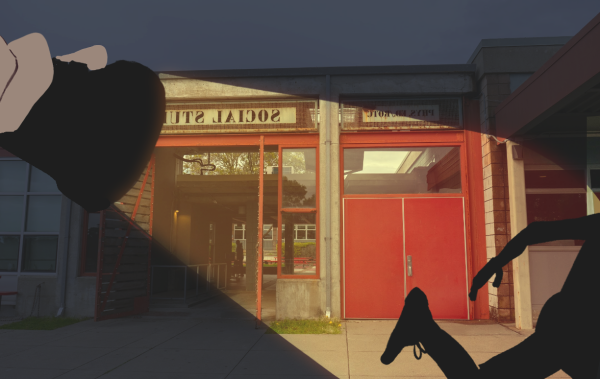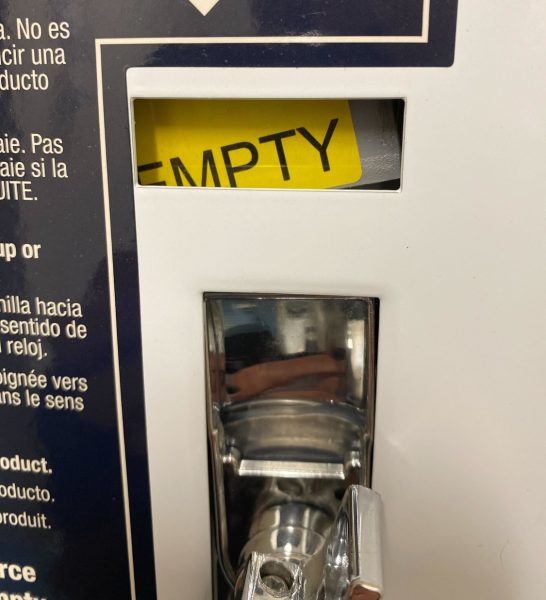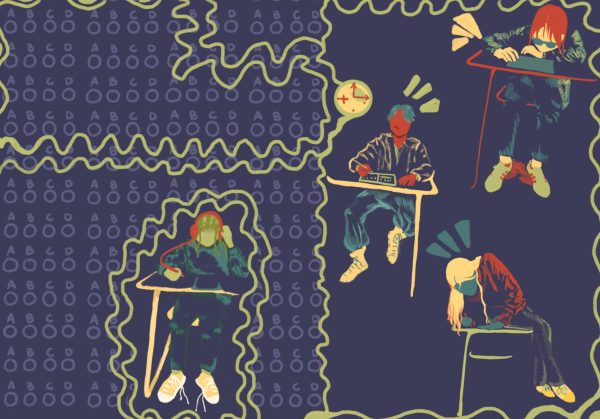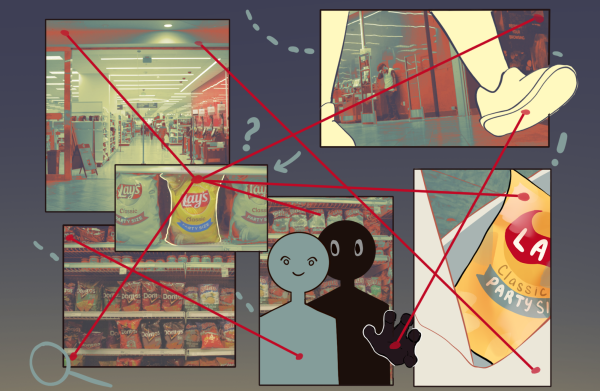The movement against sexual violence continues with a new focus
Within the past week, Lowell students have participated in two protests against sexual violence and the poor administrative response to the demands students have made regarding the issue. On Friday, Feb. 25, more than a dozen students gathered outside Kezar Pavilion, where the city-wide boys basketball championship game was taking place. According to one of the organizers of the protest, junior Sasa Ramos, students were protesting the presence of the basketball teams players with allegations of sexual misconduct against them and the broader rape culture on student athletic teams at Lowell.
Students had initially planned to silently protest with signs calling attention to the issue inside of the stadium, but were stopped by Lowell’s security guards before they reached the entrance. “Security told us that if we do try to go in and refuse to give them our signs, the police will have us removed,” organizer and junior Cal Kinoshita said. Kinoshita felt that this was a violation of his rights to free speech and petition under the First Amendment. He then decided to relocate the protest outside to the sidewalk in front of Kezar.
Four days later, on March 1, hundreds of students dressed in black walked out of class at 12:15 p.m. and gathered at the flagpole. Multiple student organizers and survivors gave speeches, and the crowd chanted calls for the administration to take action to protect survivors. According to Kinoshita, the walkout was a response to the way protesters had been treated at Kezar. “We wanted to highlight the intentional silencing of students,” he said. “And how we, as all the students stood up here, are not giving into that silence.”
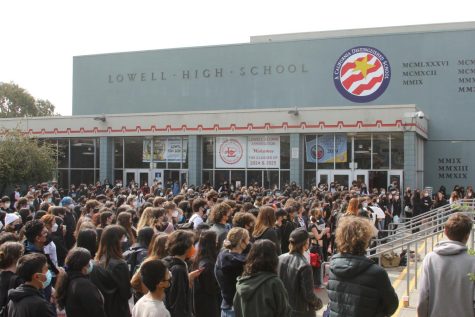
These two protests are the latest in a series of demonstrations at Lowell that began in November 2021, when a number of sexual harrasment allegations were posted on social media. Frustrated by a perceived lack of action from Lowell’s administration, students have been rallying together to advocate for change, and have continued to protest. According to Kinoshita, Friday’s demonstration was inspired by a cover story published by The Lowell on Feb. 25 that protesters believed highlighted the lack of administrative action as well as the alleged prevalence of rape culture among student athletes and coaches. Furthermore, activists believe that the attempts to disperse Friday’s protest at Kezar demonstrate how Lowell’s administration has sought to silence student voices in regards to sexual assault.
Soon after being threatened with police action at Kezar, the protesters were approached by principal Joe Dominguez. Dominguez told them that school sanctioned events must be free of distractions and potential disruptions because they may pose a threat to students’ safety. “Whether students feel it is right or not, I have to protect the players on the court to make sure that they’re not unjustly targeted,” Dominguez said in a subsequent interview. “There might be members of the court that are accused, but there’s also members from both schools that have nothing to do with that.” Kinoshita believes that Dominguez’s reasoning unfairly restricted students’ First Amendment rights and prioritized the protection of students who choose to continue playing alongside students with allegations against them. “He’s so worried about these students who are complacent and being a teammate with alleged abusers,” Kinoshita said. “[Meanwhile] students are being punished for trying to peacefully protest.”
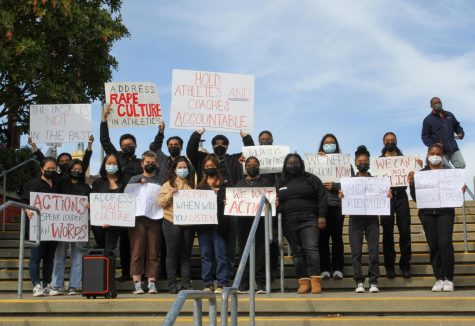
To some students, the events on Friday were part of an intentional effort by the administration to stifle student protest. Ramos was angered by how students were denied entry to the pavilion, where they had planned to peacefully protest. “I feel like it’s very contradictory,” they said. “Admin tells us that students have a voice and that [our] opinions are valid, but when we express our opinions and things that they don’t like, they kick us out and shut us out.” Furthermore, seeing co-Title IX coordinator Kahlila Liverpool taking down posters yesterday, March 2, that criticized the administration frustrated many students.
The lawfulness of the events that transpired on Friday is being called into question. On March 1, a Board of Education meeting was held with the first item addressing anti-sexual violence efforts. When the issue was opened to discussion among student delegates and commissioners, student delegate Joanna Lam brought up the incident, stating that she felt it violated Board Policy 5145.2. This policy outlines the rights of students to express their freedoms of speech and press both on and off campus. In the case of off campus expression, students may be disciplined when “such expression poses a threat to the safety of other students, staff, or school property, or substantially disrupts the educational program.” Lam did not believe this was the case during Friday’s demonstration. “Silently protesting a basketball game does not, to me, seem like it validates a response from site administration to call the police,” she said. Commissioners on the Board of Education acknowledged the event and announced that they would be investigating it further.
The administration stands by the way in which they handled the protest on Friday. According to Dominguez, the rights stated in rules like Policy 5145.2 do not entitle students to disrupt an event. Dominguez did not know what the goal of the protest was, and ultimately decided it could pose a threat to other students. “Students have a right to protest, but they don’t have a right to disrupt the educational process or school sanctioned event,” Dominguez said. “So I had to make that call, which is hard because I respect the First Amendment right.”
Despite the controversy surrounding Friday’s demonstrations, student activists are determined to not let the issue disappear. Kinoshita is committed to continuing advocacy against sexual harassment at Lowell. “We’re not going anywhere,” he said.
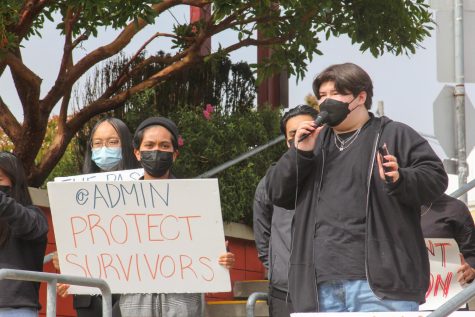

Kelcie is a senior at Lowell who can be found in the journ room working, drinking coffee, and listening to music. Her older brother once mentioned that there are only three guarantees in life: death, taxes, and Kelcie not waking up to her alarms. She also happens to have a paradoxical relationship with chicken… go figure.

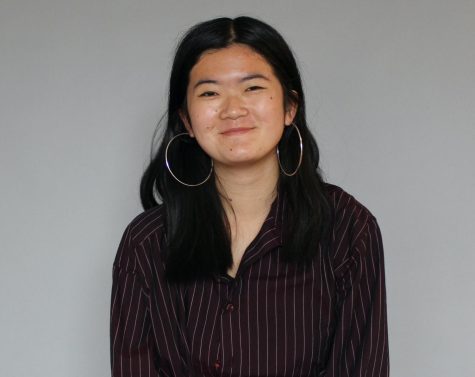

Marlena is a senior at Lowell. When she isn't at school she's probably at the lab, watching a movie, or sitting on the sidewalk listening to music (usually Björk).

Libby is a photographer and multimedia editor for the Lowell; taking on the world with a camera in one hand and a Peet's coffee cup in the other. She is a very contemplative soul, and you may often find her pondering large and abstract philosophical ideas (see staff profile photo). Libby also enjoys writing silly little staff profiles about herself instead of doing her English homework!!

Yeshi (yEEshi) is a senior at Lowell that loves the school breakfast bagels a little too much. After school hours, you can find her at the beach or in the park daydreaming about almost anything and everything.


